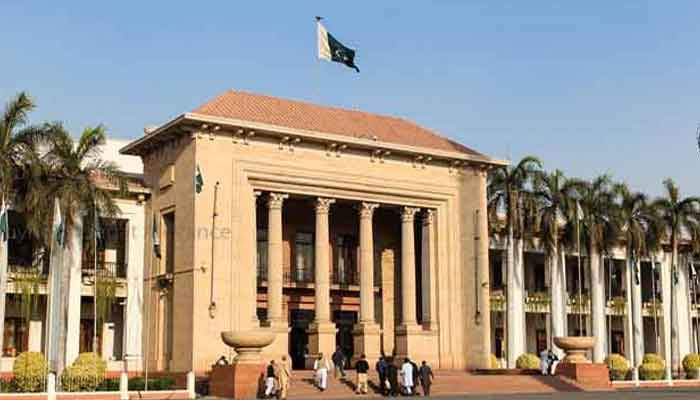ECP can act in Punjab in case of caretaker impasse
The ECP has the authority to appoint any suitable dignitary as the caretaker chief minister for the supervision of elections in the Punjab provincial assembly, in addition to the list prepared by the former treasury and opposition
ISLAMABAD: The Election Commission of Pakistan (ECP) has the authority to appoint any suitable dignitary as the caretaker chief minister for the supervision of elections in the Punjab provincial assembly, in addition to the list prepared by the former treasury and opposition.
A former secretary of the ECP told The News Tuesday evening on the condition of anonymity that the commission derives authority for such an action from a Supreme Court verdict handed down before the general elections of 2013 where the court authorised the ECP to take any action for the sake of holding free, fair and credible elections in the country.
The former ECP secretary, who served until the beginning of 2011, reminded that in the existing tense political divide, the selection of any person from the list provided by the two parties would be unacceptable for the party whose list was ignored. That party could challenge the commission by claiming it was partisan. It could ruin the election atmosphere, and the outcome at the polls could become highly disputed. It would defeat the purpose of the ECP, which is to hold free and fair elections, the former secretary said.
Interestingly, the names proposed by outgoing Punjab Chief Minister Pervaiz Elahi have been discarded, not by the other side, but because the list appears to have been made hastily and without thought.
Nasir Khosa, the former principal secretary to the prime minister, who had previously served as secretary to the chief minister, had declined to become the caretaker chief minister.
The second name of Naseer Ahmad has been struck down due to the fact that he is a dual national; he is also a British passport holder. He was a federal minister in the PMLQ government, and his daughter is married to the son of Chaudhary Pervaiz Elahi.
Sardar Ahmad Nawaz Sukhaira is the third nominee of the outgoing chief minister, who is a serving federal secretary and supposed to attain superannuation on January 31 this year as federal secretary of the Cabinet Division. His eligibility could be disputed under the provisions of articles 62 and 63 of the Constitution.
According to sources, the opposition’s nominees are not controversial, but they are unlikely to be accepted by the PTI.
Ahad Khan Cheema is a respected and thorough former civil servant who was put behind bars by the PTI government under the instructions of Imran Khan. He was associated with the power projects of Nawaz Sharif’s government and known for his efficiency and hard work. He spent most of the PTI government’s tenure behind bars. He resigned from the government service during the early days of the incumbent government, but was later appointed an adviser to the prime minister on Establishment with the status of federal minister. It would be highly improbable that the PTI would accept him as the caretaker provincial chief executive.
The other name given by the opposition is that of Mohsin Naqvi, who is the owner of a reputed media house and was a respected working journalist for a number of years. He is also a close relative of the Chaudhrys of the PMLQ; former president Asif Ali Zardari kept Mohsin Naqvi very close to him, and he is known as a close political aide of the PPPP’s supreme leader.
While citing the aforementioned situation, the former secretary of the election commission has maintained that the ECP will have to take some unconventional steps to ensure free, fair, and credible elections. He has also urged political parties to consider constitutional amendments that would allow the commission to act more freely in such a complex situation.
-
 Michelle Obama Gets Candid About Spontaneous Decision At Piercings Tattoo
Michelle Obama Gets Candid About Spontaneous Decision At Piercings Tattoo -
 Bunnie Xo Shares Raw Confession After Year-long IVF Struggle
Bunnie Xo Shares Raw Confession After Year-long IVF Struggle -
 Brooks Nader Reveals Why She Quit Fillers After Years
Brooks Nader Reveals Why She Quit Fillers After Years -
 Travis Kelce Plays Key Role In Taylor Swift's 'Opalite' Remix
Travis Kelce Plays Key Role In Taylor Swift's 'Opalite' Remix -
 How Jennifer Aniston's 57th Birthday Went With Boyfriend Jim Curtis
How Jennifer Aniston's 57th Birthday Went With Boyfriend Jim Curtis -
 JoJo Siwa Shares Inspiring Words With Young Changemakers
JoJo Siwa Shares Inspiring Words With Young Changemakers -
 James Van Der Beek Loved Ones Breaks Silence After Fundraiser Hits $2.2M
James Van Der Beek Loved Ones Breaks Silence After Fundraiser Hits $2.2M -
 Disney’s $336m 'Snow White' Remake Ends With $170m Box Office Loss: Report
Disney’s $336m 'Snow White' Remake Ends With $170m Box Office Loss: Report -
 Travis Kelce's Mom Donna Kelce Breaks Silence On His Retirement Plans
Travis Kelce's Mom Donna Kelce Breaks Silence On His Retirement Plans -
 Premiere Date Of 'Spider-Noir' Featuring Nicolas Cage Announced
Premiere Date Of 'Spider-Noir' Featuring Nicolas Cage Announced -
 Pedro Pascal's Sister Reveals His Reaction To Her 'The Beauty' Role
Pedro Pascal's Sister Reveals His Reaction To Her 'The Beauty' Role -
 Kate Middleton Proves She's True 'children's Princess' With THIS Move
Kate Middleton Proves She's True 'children's Princess' With THIS Move -
 Paul Anka Reveals How He Raised Son Ethan Differently From His Daughters
Paul Anka Reveals How He Raised Son Ethan Differently From His Daughters -
 'A Very Special Visitor' Meets Queen Camilla At Clarence House
'A Very Special Visitor' Meets Queen Camilla At Clarence House -
 Jodie Turner Smith Shares One Strict Rule She Follows As A Mom
Jodie Turner Smith Shares One Strict Rule She Follows As A Mom -
 Hailey Bieber Reveals KEY To Balancing Motherhood With Career
Hailey Bieber Reveals KEY To Balancing Motherhood With Career




